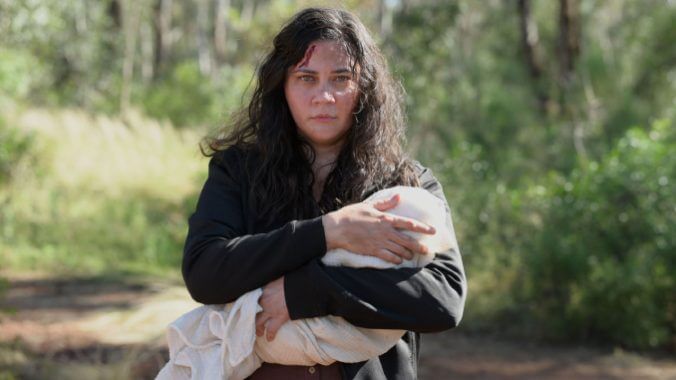Trauma Horror The Moogai Isn’t More than Its Metaphor

Recent movies have begun, more and more, to confront the underreported disappearances of Indigenous women (Erica Tremblay’s Fancy Dance), and Aboriginal Australian women in particular (Ivan Sen’s Limbo), and the public and institutional indifference to this traumatic truth. There’ve been Aussie horror movies, like The Babadook, which manifest grief and pain into a monstrous physical form. An attempt to combine these ideas seems natural. But writer/director Jon Bell’s The Moogai expands his 2021 short film into just that: An attempt. A standard-issue horror barely making the move from short to feature (it’s only around 80 minutes before credits), The Moogai is a scare-free blunt instrument, imprecise and uninterested in its own genre beyond its potential for metaphor.
It doesn’t help that the Moogai itself looks a bit like a Spirit Halloween Babadook, with long nasty fingers and a black, spindly silhouette. That the Moogai—a Bundjalung boogeyman, a stealer of children—isn’t even halfway scary is representative of its film’s main issue: Despite the palpable pain pulsing beneath the surface, that surface is so generic and transparent as to do away with its own purpose.
As Shari Sebbens and Meyne Wyatt reprise their roles from the short film, as an Indigenous couple (M&A lawyer Sarah and carpenter Fergus) welcoming their second child, we’re hard-pressed to pay too close attention to this by-the-numbers post-pregnancy haunting. We’re disinclined to dive deeper because we’ve so clearly seen it all before. Each scene after Sarah gives birth to her baby boy—dying for a moment on the table, because why not?—was pulled from a horror how-to guide that we’ve all leafed through just by existing in pop culture.
There’s no surprise when a young girl who isn’t daughter Chloe (Jahdeana Mary) starts popping up at night, moving out from the shadows to drive Sarah up the wall. There’s nothing surprising about Sarah’s deteriorating mental state, nor how the movie half-heartedly attempts to blur some of her psychological lines. Is it a haunting? Is it sleep deprivation? Is it postpartum depression? No…no, it’s clearly a haunting.
The only surprising thing about the supernatural wringer the family is put through is the new baby: He’s dropped on his head, whacked against furniture or otherwise given a hard time over the course of his various disappearances, misplacements and reappearances, and the resilient infant takes it like a champ. It’s also unintentionally hilarious once the movie’s lost your investment, which doesn’t take long.
-

-

-

-

- Curated Home Page Articles By Test Admin October 21, 2025 | 3:10pm
-

- Curated Home Page Articles By Test Admin October 21, 2025 | 2:57pm
- Urls By Test Admin October 21, 2025 | 2:57pm
- Curated Home Page Articles By Test Admin October 21, 2025 | 2:55pm
-

-

-

-

-

-

-

-

-

-

-

-

-

-

-

-

-

-

-

-

-

-

-

-

-

-

-

-

-

-

-




































